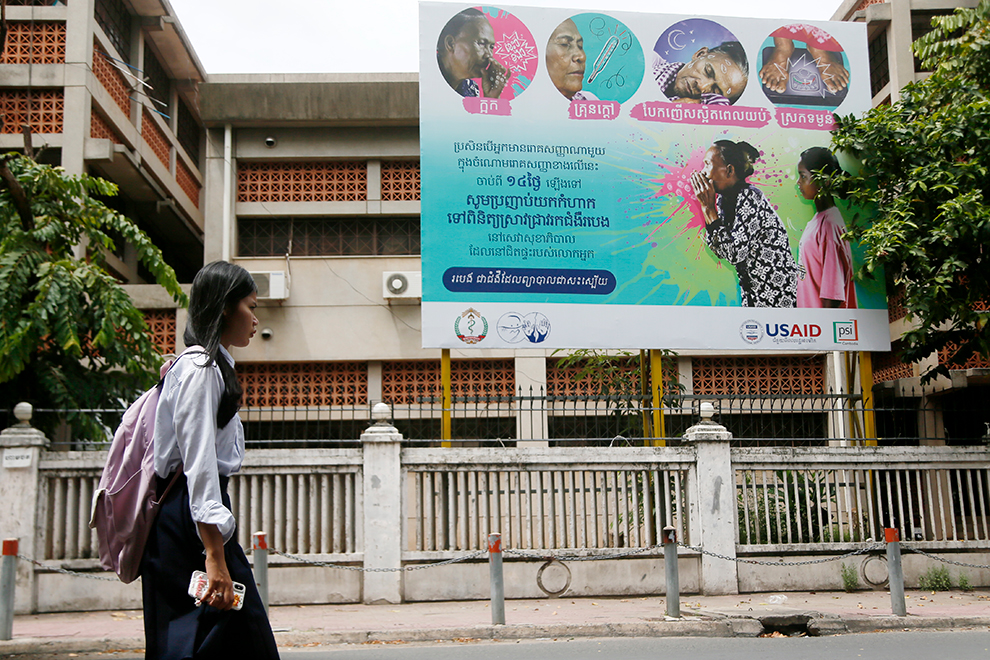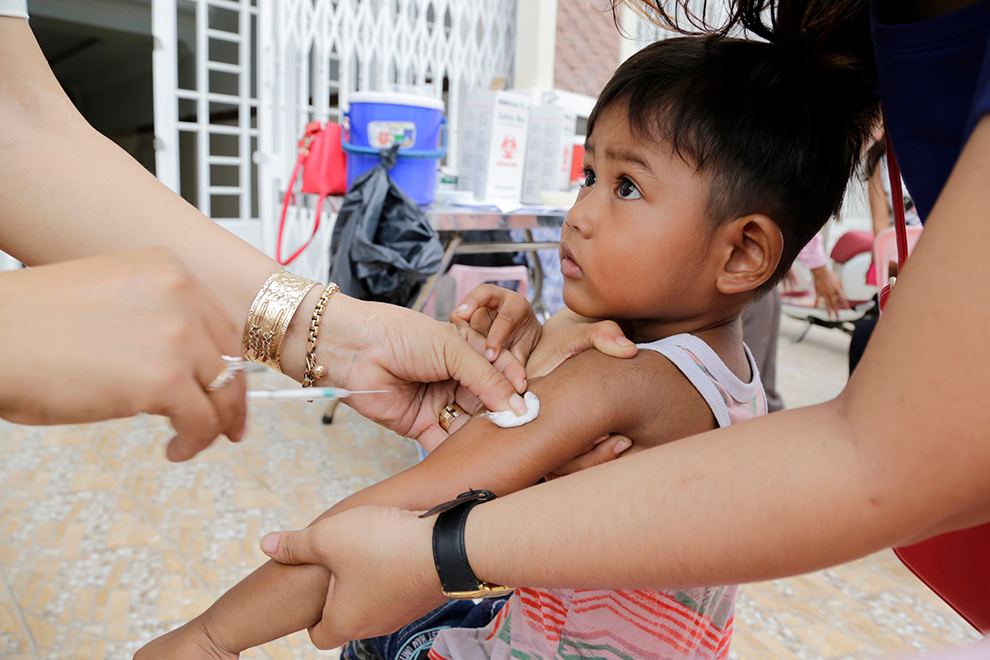
A student walks past a banner raising awareness of Tuberculosis in Phnom Penh’s Chamkarmon district. Post staff
Samantha Power, USAID administrator, has highlighted the deepening partnership between the US and Cambodia in the fight against tuberculosis (TB) and malaria.
After just over three-and-a-half years in her role, Powers shared her excitement at visiting Cambodia to see how “previous investments by USAID – and really from the American people – have produced such significant results”.
“I gave the example of the elimination of malaria. The work done to eliminate malaria was done by Cambodians,” Power said, during an October 23 press conference in Phnom Penh.
“It's Cambodia that achieved, is on the verge, I should say, of achieving that very, very significant accomplishment. But USAID has been present over the last several decades in supporting that work,” she added.
As the first USAID administrator to visit Cambodia, Power expressed her commitment to supporting Cambodian public health initiatives, emphasising that these efforts benefit both countries in the long run.
“Being back here and discussing the deepening engagement between our two countries – the US and Cambodia – has been very enlightening for me,” she remarked.
“The partnership of today builds on several decades of investment by USAID in support of the dignity and prosperity of the Cambodian people,” she added.
Cambodia has made significant strides in public health over the past few decades, particularly in the fight against malaria.

A young boy receives an anti-malaria vaccination in Kakab commune’s Chomkar Ouv Loek village, in the capital’s Por Sen Chey district. Post staff
Power noted that Cambodia has now marked six straight years without a single death from malaria, and is on the cusp of meeting its goal of eliminating malaria.
She credited local public health heroes, such as Yeang Chheang, Cambodia’s first entomologist, for their dedication to this cause, while also acknowledging USAID’s long-standing support in the battle.
Power met with Chheang, who saved countless lives by distributing malaria medication following the fall of the deadly Khmer Rouge regime in the late 1970s, and who subsequently helped rebuild Cambodia’s National Malaria Program.
USAID spokesperson Benjamin Suarato said “she congratulated Chheang for receiving the ‘Unsung Hero’ award at the UN Climate Change Conference (COP28) in Dubai in December 2023 for his efforts to eliminate malaria and shared her appreciation for his valuable contributions to the US President’s Malaria Initiative (PMI).”
“With US government support through the PMI, by 2025 Cambodia is on track to become the first PMI bilateral country to achieve malaria elimination,” she added.
Beyond malaria, Power stressed USAID’s focus on TB elimination. Cambodia is working toward the goal of eliminating TB by 2030, and USAID has pledged an additional $4 million to support local community-based efforts.
“Yesterday in Siem Reap, I was able to witness a very energetic effort to reach at least some of the Cambodians who have tuberculosis, but often they do not know they have TB until it is not only too late for them, but too late for others, given how the disease spreads,” she said.
USAID's investment aims to bring diagnostic technology to communities, reducing the need for individuals to travel long distances for TB diagnoses.
Power emphasised the importance of these investments, explaining that USAID's assistance goes beyond just funding – it fosters long-term relationships with local communities.
“One of the things about USAID that is not well known, and even that I was not aware of before I came to USAID, is that three-quarters of our staff in the countries in which we work are nationals of the countries in which we work,” she explained.
In Cambodia, this means the vast majority of USAID staff are Cambodians, who understand the unique challenges their communities face.
While health remains a key focus, Power also addressed Cambodia's education system, highlighting USAID's role in doubling pre-school enrolment since 2007 and improving reading scores across the country.
She pointed out that USAID's support has allowed the Cambodian government to adopt successful educational strategies, furthering the country's progress toward universal access to primary education.
In addition to the ongoing fight against TB and malaria, Power announced a new initiative to tackle lead poisoning in Cambodia.
USAID will invest $1 million in a national survey to assess blood lead levels among children, helping to identify the sources of lead poisoning and guide future efforts to eliminate it.
“There is significant lead poisoning among children in many developing countries, including Cambodia,” she noted.
“Understanding the sources of lead poisoning is absolutely critical to eliminating it going forward,” she continued, explaining that USAID will embark on a multifaceted effort to regulate lead and to ensure that Cambodia's children are no longer exposed to something that can be very harmful to educational attainment and can ultimately even cause premature death.











